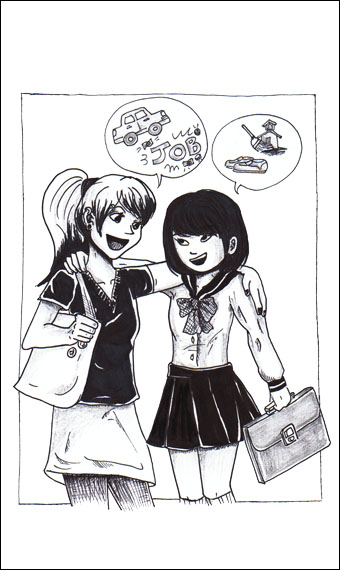

Studies show American students don’t perform as well on academic tests and don’t study as much as their global peers. According to the Broad Education Foundation, which provides philanthropic support to American K-12 public education, 1.2 million students drop out of high school every year and 44 percent of dropouts under 24 are jobless. Even though American education varies state to state, it seems as though other developed countries’ education systems have begun to surpass our own.
Bob Compton, a venture capitalist, produced a documentary called Two Million Minutes, illustrating the amount of time teens have in high school and how they choose to spend it. The film follows the lives of teenagers from three different countries: the United States, India, and China. While the documentary shows a general trend of greater and more intensive high school education in India and China as compared to the United States, it also points out a bigger impact that may become evident in the future. The documentary states, “compared to the U.S., China now produces eight times more scientists and engineers, while India puts out up to three times as many as the U.S.” With such drastic effects manifesting, how does education in other countries compare?
Aragon junior Quentin Bellon, who has traveled to France many times, says, “Starting sophomore year in France, you can choose what you are interested in, which will be the classes you take for the next two years. For example, if you want to study business you can take business related classes and are not required [to take] a science class, sort of like college here and declaring your major.”
The school system in France is very career based, as opposed to American schooling, which provides a very general approach. Some argue that American schooling is too broad in its scope and that narrowing its focus, depending on the student, would be most effective for entering a more educated workforce.
Bellon adds, “At the end of your senior year there is a big test on everything you learned in your three years of high school. This is somewhat like the SAT but… harder. Depending on how well you do on that test determines which college accepts you… there are no college apps, which is nice unless it is a really prestige school.”
Even though the French testing system for higher education may be more difficult and exclusively number-based, the high school atmosphere is less competitive in many cases. Bellon adds, “Overall I think the work ethic there is much more relaxed and not as vigorous as America. They have more class selection than American high schools (like seven different language classes)… but I prefer American schools.”
Freshman Jonah Buchwald currently attends school in the Bay Area, but spent the years of kindergarten through third grade attending Marymount International School in Rome. He says, “Going to [Marymount International] school didn’t prepare me for American school; there is more homework in America and less room for messing around.” In Rome, the school schedule is different. Students attend school Monday through Friday—and Sunday. However, it is a trade-off; even though they have an extra day of school, they get released at noon everyday in order to fit the Italian lifestyle.
Another school system that is in session on Sundays is the Israeli school system.
Israeli student Bar Kalika, who studies at the Reali School in Haifa, says, “In my school I learn from 8 a.m. to 2 p.m. generally. I am in ninth grade. In America when you’re in ninth grade you [go] to high school, but in Israel high school begins in tenth grade. I love my school, [but] one of my biggest dreams is to study in a university in America.”
Similar to any student in the United States, she also receives a lot of homework and must take many quizzes and exams within any given week.
Indeed, although Israel is not geographically close to the US, the school systems are quite similar when it comes to homework and classes. However, there is one very striking difference; after graduating high school, Israeli teens join the army. Boys must serve for three years and girls must serve two—it is mandatory for 18 year olds to enlist. The level of maturity and responsibility for this task shapes many Israeli students by preparing them for a self-sufficient life, but it is only after they have served that they can apply to college.
The German education system school system is completely different in many ways. Sophomore Marlon Paul, who attended Aragon last semester and is currently studying in Germany, says, “In Germany we have a block schedule, so we have more classes—about 12—[but] we get less homework.”
Aragon senior Julia Pera, who has family in Germany and has traveled there many times, says, “The school system I am most familiar with is the one in Bavaria (Southern Germany). The school system in Germany is really different. ‘Grudschule’ is the equivalence of elementary school (four years). Then you have the option to go to ‘real schule,’ which is like middle school, until the tenth grade [when students] go to a ‘fach ober schule,’ a school that focuses on a specific career. Some can go to the ‘gymnasium,’ which goes up to the 13th grade and is usually more advanced than the ‘real schule.’ After graduating the ‘gymnasium,’ you have the option to start working or go to a university. Almost all universities are career oriented.”
German education is, perhaps, the exact opposite of generalized American schooling in that it focuses on vocational skills from an early age.
Pera adds, “Even if you’re not doing so great in school, you can learn a profession by applying for an apprenticeship. For example, you can sign up for a three-year program, which is a combination of school and work. After those three years you have a masters degree and a profession.”
This specialization of education in foreign countries may be helping them get ahead. However, with the American education system fairly cemented, any changes reflective of foreign schooling systems may be far in the future. For the most part, high school in developed countries is a fairly comparable experience.
Even Kalika, who studies over 7,000 miles away from Aragon, admits, “I feel like a nerd, but I love my school and my teachers!”




